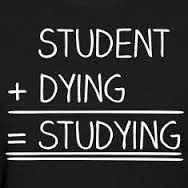Here is how I approached the comp and used it to help prepare me to succeed on step 1 of the USMLE.
It’s just a practice test
At the end of the day the comp exam is a practice step 1 exam and nothing more. I took five practice exams when I studied for step 1 and step 2 respectively. These were NBME practice tests and were just like the comp because the comp is a practice exam that is meant to show you were you stand. Sure, it will suck if you have to retake the comp but your end goal is to crush step 1! So don’t worry about passing or failing the comp. In the long run it doesn’t matter if you pass or fail. If you fail, it means that you aren’t ready to take step 1. And hey, I passed the comp on my first try but I certainly wouldn’t say I was ready for step 1. I still required two more months of studying in order to get my scores up.
Pass the comp but focus on step 1
Back in my day we had 4 weeks to study for the comp after our fourth semester final. I understand that times have changed but my study strategy should still ring true. My strategy was simple: I wanted to pass the comp so I didn’t have to worry about it after I left the island. However, at the end of the day the comp doesn’t really matter. All that matters is crushing step 1. No residency program will know if you passed or failed your comp exam but they will certainly know what you got on step one.
Don’t try and study everything
It doesn’t pay off to try and study everything before you take the comp because there simply isn’t enough time. During my third and fourth semester I was using the Kaplan step one question bank to study for the NBME final exams so I chose to use a Kaplan diagnostic test to see where I stood. Turns out I sucked at everything but there were certain subjects I was particularly bad at. As I suspected, my best subjects were ones that I had just studied for my fourth semester final. Strategically, I chose not to study these subjects and hoped that I would remember them when I took the comp. Instead, I focused on a few organ systems that I was particularly bad at, specifically pulmonology, nephrology, and gastroenterology. I also chose to focus on cardiology because it is the single organ system that takes up the largest composition of questions on step one.
Start studying for step one when you start studying for the comp
When I left the island I had already studied four organ systems (the three I sucked at plus cardio). It wasn’t sufficient enough to allow me to skip them during my two months of preparation for step one but it gave me one hell of a head start. Again, it doesn’t matter if you pass the comp or not. Sure it will suck if you have to take it again but you have to keep the long-term goal in mind of not just passing step one but crushing it. Passing step one might get you a residency but killing step one will get you an amazing residency.
And do practice questions. Lots of practice questions.
The more practice questions you do the higher you will score. There is simply not way around it. By the time I took step 1 I had completed half of the Kaplan qbank once, all of UWorld, and all of the questions I answered incorrectly in UWorld once which comes to a grand total of 3,000 questions or so. Some people did all of Kaplan, UWorld, and one or two other qbanks but I personally felt like that’s overkill but everyone is different. UWorld should be the minimum though.
Practice questions will not replace your studying but instead should supplement and guide you in which topics you need to study. Practice questions show you your weaknesses and give you topics to go back and study. I suggest one full question set which should take you one hour followed by three hours to review those questions. Then study for four hours in the afternoon after an hour break. Then eat, sleep, repeat!




